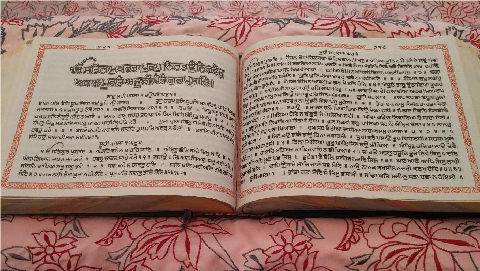BHAI, of Indo Aryan origin (Sanskrit bhratr, Pali bhaya), means brother in its literal sense and is employed as an honorific as well as in the dominant familial sense and as a title of affection between equals. It has been used in the Guru Granth Sahib in the latter sense and there are several apostrophic examples none of which seems to imply any special rank or status. However, by the middle of the seventeenth century, it was being used as a title implying distinction: the earliest example is the Bala Janam Sakhi (AD 1658) which refers to its putative author as Bhai Bala. The naturalness of its use in this particular context suggests that it must have developed the honorific connotation even earlier though it does not necessarily follow that these connotations were clearly apprehended in earlier usage.
BHANA, lit. liking, pleasure, will, wish or approval, is one of the key concepts in Sikh thought. In Sikhism, it refers specifically to God`s will and pleasure. Raza , an Arabic term popular in the context of various schools of Sufi thought, also appears frequently in the Sikh texts to express the concept of UMArSA bhana. According to this concept, the Divine Will is at the base of the entire cosmic existence. It was His bhana, His sweet will which was instrumental in the world`s coming into being: "Whenever He pleases He creates the expanse (of the world of time and space) and whenever He desires He (again) becomes the Formless One (all by Himself)" (GG, 294).
BIR, a term used for a recension or copy of the Guru Granth Sahib, is derived from Skt. verb vid meaning "to make strong or firm, strengthen, fasten, or to be strong, firm or hard." The Punjabi verb birana which means "to fix, bind or fasten (something) firmly, or to lay (a gun)" is from the same root. Guru Arjan having compiled the Holy Book deputed one of his leading disciples, Bhai Banno, to go and get the volume bound in Lahore, perhaps because facilities for proper binding did not then exist at Amritsar.
BAANA: Literally: dress. In Sikh cultural terminology it means all the five Kakaars (articles of faith) plus a Chola (a long shirt), a tight fitting trousers, a Kamarkassa (a belt to tighten Gaatra and like a sash around the waist) which make one very active. This was actually a dress for the battlefield. A Sikh is expected to be ever ready in Baana at every moment because for a Sikh the world is like a battle field and he/she has to act in every situation in the discipline of a soldier in a battle field.












